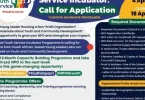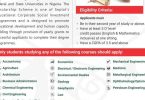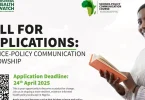
Mercy Corps Nigeria
Consultant at Mercy Corps Nigeria – 9 Job Vacancies. Please make sure you read the job requirements before applying for this position.
Mercy Corps is a leading global organization powered by the belief that a better world is possible. In disaster, in hardship, in more than 40 countries around the world, we partner to put bold solutions into action – helping people triumph over adversity and build stronger communities from within, now and for the future. Operating in Nigeria since 2008, Mercy Corps works in fragile and conflict-affected environments and has been providing critical relief aid, empowering communities to prevent and respond to violence, inclusive economic development, recovery from crisis, building better lives and transforming their communities for good.
We are recruiting to fill the position below:
Job Title: Consultant
Locations: Abuja (FCT), Adamawa, Benue, Borno, Ebonyi, Gombe, Kebbi, Niger & Yobe
Timeframe / Schedule: 10th January 2025 – 10th February 2025
Reports Directly to: MEL Manager / Director Cash Transfer Project
Works Closely with: CLA Adviser, MRM Officers, MIS Officer.
Scope of Work
Project / Consultancy Title:
- Analyze, develop report, and validate findings with stakeholders using Advanced Post Distribution Monitoring (PDM) qualitative and quantitative data collected across 9 states.
Project Location(s):
- Northeast Nigeria – Borno, Adamawa, Yobe and Gombe; Northcentral – Niger, Benue and FCT; Northwest – Kebbi; Southeast – Ebonyi.
Background to USAID Rural Resilience Activity
- COVID-19 affected the agricultural sector – the bedrock of Nigeria’s economy – and in a context like NEN, its impact has amplified the already limited by already fragile market actors resilience due to insecurity and conflicts households’ purchasing power, weak food distribution and supply chains, and low income and livelihoods options.
- Similarly, the north west and key north central states also experienced a brunt of COVID-19 shocks.
- The COVID-19 shock exacerbated emerging insecurity issues and floods facing these states.
- In these context, women and youth remain particularly vulnerable, as COVID-19 has further reinforced the barriers related to access and agency, limiting women and youth economic empowerment and ultimately, their resilience.
- Challenges affecting the agricultural sector – the bedrock of Nigeria’s economy – have been exacerbated by the COVID-19 pandemic, causing a spike in food price inflation rate (reaching 18.17% in March 2021) thus limiting households’ purchasing power, disrupting food distribution and supply chains, depleting food stocks, and a loss of income and livelihoods opportunities.
- This has ultimately heightened the country’s already vast food security crisis, affecting all four dimensions of food security – availability, access, stability, and utilization. Recent findings from the March 2021 Cadre Harmonize (CH) analysis project that over 5 million people will face food crisis or emergency (IPC phase 3 or 4) across the BAY-G States, Benue, Kebbi, Niger, Ebonyi by August 2021, highlighting an increase in food consumption gaps if appropriate responses are not designed.
- In this context, women and youth remain particularly vulnerable, as COVID-19 has further reinforced the barriers related to access and agency, limiting women and youth economic empowerment and ultimately, their resilience.
- To help market actors withstand the shocks and stresses presented by COVID-19 the Activity plans to deliver cash transfers to 50,090 individuals (45,000 farmers, 5,000 microenterprises, 50 lead firms, and 40 women cowpea processors).
- Working in the Feed the Future portfolio states of Borno, Yobe, Adamawa, Gombe, Kebbi, Niger, Benue, and Ebonyi, and FCT over a period of 10 months, the Activity aims to synchronize with the harvest cycle to ensure that agricultural collectives, microenterprises, smallholder farmers, and lead firms have targeted support to survive, rebuild, and recover from the economic impact of this complex crisis.
- Of the targeted 45,000 farmers at least 50% will be women and other 50% youth.
Consultancy Summary
- We seek a highly motivated individual/team who believes deeply in Mercy Corps’ organizational mission and who can display a record of results and achievements, providing programs with technical guidance and support in building resilience of market actors (including farmers, MSMEs, processors) using Market System Development approach in conflict affected areas like northeast Nigeria.
- In addition, the team should display their experience in supporting interventions that transitions humanitarian support to more resilient and recovery interventions. Also, the team should display experience in evaluating/assessing cash transfer interventions.
Consultancy Outcomes:
- Analyze qualitative and quantitative data on PDM for smallholder farmers and MSMEs.
- Develop report and validate the findings with stakeholders (Rural Resilience Project Management Unit (PMU), Technical Support Unit (TSU), State government stakeholders, and USAID).
What the assessment aims to determine:
- The survey will household-related indicators as stated in the AMEL plan:
- FTFRRA-3: Household daily per capita expenditures (as proxy for income) in target communities.
- FTFRRA-7: Value of income generated from off-farm activities
- GNDR-2: Percent of female participants in USG-assisted programs designed to increase access to productive economic resources
- YOUTH-3: Percent of participants in USG-assisted programs designed to increase access to productive economic resources who are youths (15-29)
- FTFRRA-16: Number of functional markets and networks as a result of USG assistance
In addition, the survey will assess:
- Effectiveness cash transfer process:
- With a special focus on the cash transfer distribution mechanism.
- Community perception of MC COVID-19 Response intervention
- Gender and conflict-related issues that may have been triggered as a result of the intervention
- Food Insecurity Experience Scale before beneficiaries received COVID-19 intervention.
- Document beneficiary coping strategies during the COVID-19 lockdown and impact of cash received on their ability to recover from COVID-19 and other related shocks
- Assess level of financial inclusion through opening of bank accounts for beneficiaries and financial services assessed
- Assess percentage of participants that are involved in farming and other productive economic activities as a result of MC COVID-19 intervention.
Basic Knowledge, Skills and Abilities required
- Minimum of 3 years of experience in conducting PDMs, evaluations for humanitarian and development projects, assessing shocks/stresses and resilience and transitioning vulnerable groups to more adaptive resilient groups;
- Evidence of having carried similar USAID evaluations including Feed the Future Activities and Bureau of Humanitarian Assistance (BHA) Projects. This include PDMs, surveys and evaluations. In addition, the Consultant should have experience in applying conflict sensitivity and DNH in fragile context.
- Use of statistical packages (SPSS, STATA, Excel), qualitative package (Atlas.ti) or data collection, transmission, and analyses.
- Excellent data presentation skills using various data visualization tools Excel, PowerBI, Adobe Illustrator and other visualization applications
Expected Deliverables
- Data analysis
- PDM Report with a maximum of 30 pages in length (excluding Annexes). The Report will have the following structure:
- Executive Summary (2 pages)
- Introduction and background (2 pages)
- PDM questions (2 pages)
- Methodology and methodological limitations (4 page)
- Key findings (15 pages)
- Conclusions and recommendations (5 pages)
- Annexes (research instruments, list of people interviewed, references to the documents reviewed, etc.).
- A final consultancy report and recommendation to Mercy Corps
Please note that all submissions should also include the following:
- The technical bid will be evaluated based on its responsiveness to the SOW and the evaluation criteria.
- The Financial Bid will only be evaluated if the Technical Bid achieves a minimum score of 60% of the points and is considered qualified through the supplier qualification process.
- Proposals failing to obtain this minimum technical threshold or those which will not be considered qualified through the supplier qualification process will not be eligible for further consideration.
- Technical evaluation will be based on the following criteria:
| Criteria | Score |
| Professional experience of the staff that will be employed to the project providing demonstrated expertise in evaluation and related processes (CVs, etc.) | 40% |
| The Applicant has at least an Associate Consultant with Bachelor’s Degree in Agriculture, Economics, and related field with at least 2 years’ experience or Master’s in Agric related tracks, Economics, Statistics with at least 3 years’ experience in conducting evaluation surveys for USAID Agriculture, livelihood and Technical Expertise and experience in nutrition, crops, livestock and related disciplines | |
| The team leader should have a Bachelor’s Degree in Statistics, Agriculture, Economics, Public Health and related field with at least 3 years’ experience or Master’s in Agric related tracks, Economics, Statistics, Public Health with at least 5 years’ experience evaluations for humanitarian and development projects, assessing shocks/stresses and resilience and transitioning vulnerable groups to more adaptive resilient groups; Evidence of having carried similar USAID evaluations including Feed the Future Activities and Bureau of Humanitarian Assistance (BHA) Projects. This include PDMs, surveys and evaluations. In addition, the Consultant should have experience in applying conflict sensitivity and DNH in fragile context. | |
| A Technical approach, methodology and level of understanding of the objectives of the evaluation | 40% |
| The submitted concept note should show understanding of the requested tasks, as articulated in the objective of the assignment and a description of how the offeror proposes to undertake the assignment in view of the implementation progress overview highlighted in section III; | |
| A clear description of how the Consultants propose to undertake the assignment, including Data analyses, visualization and presentation plan. | |
| Appropriateness of the approach in relation to the objectives of the programme. | |
| Work plan/time scales given in the proposal and its adequacy to meet the evaluation objectives and questions | 5% |
| Prior experience of handling projects of this nature (examples of similar services provided, references, etc.). | 10% |
| A reputable track record of having carried similar USAID evaluations including Feed the Future Activities and Bureau of Humanitarian Assistance (BHA) Projects. This include PDMs, surveys and evaluations. In addition, the Consultant should have experience in applying conflict sensitivity and DNH in fragile context. | |
| Conducting large scale studies demonstrating experience in applying qualitative and quantitative research methodology. | |
| Tax Identification Number and/or Tax Certificate | 5% |
Application Closing Date
2nd December, 2021.
Method of Application
Interested and qualified candidates should send their Applications to: ng-consultancy@mercycorps.org using the Job Title as the subject of the mail.






